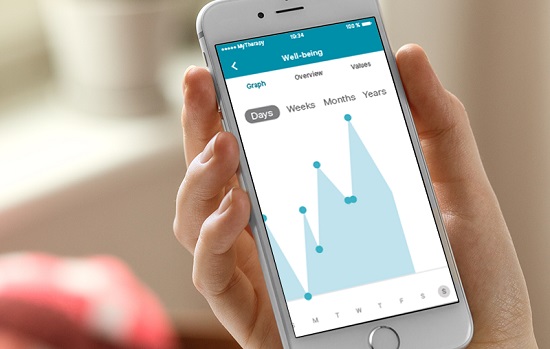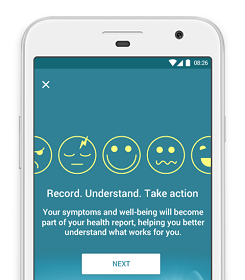Tired of Being Tired? Here’s an App to Help You Manage Chronic Fatigue Syndrome
To Treat CFS, You Need to Discover What Treatment Options Work Best for You. Find out How Mytherapy Can Help You Improve Your Quality of Life

Chronic fatigue syndrome (CFS) is one of several terms used to described a long-term disease that causes persistent physical and mental exhaustion. This condition is also referred to as systemic exertion intolerance disease (SEID) or myalgic encephalomyelitis (ME). CFS it is a complicated disorder characterized by extreme fatigue that can’t be explained by another underlying medical condition. The symptoms differ between people and range from mild to severe. The fatigue may worsen with physical or mental activity and it doesn’t improve with rest. In many cases, the chronic exhaustion can lead to depression, social isolation, lifestyle restrictions, and increased work absences.
There is currently no cure for CFS, but the symptoms and complications associated with it can be effectively managed by a personalized treatment plan that combines medication, graded exercise programs, and psychological counselling. However, adhering to these treatment plans and therapy isn’t easy - especially if you are feeling constantly exhausted and drained. It is therefore important that you have a system in place that will help you remember to take your medication and attend appointments. Smartphone health apps, like MyTherapy, can help you with this.
MyTherapy is an innovative and practical medication reminder and health tracker app that is designed to help people living with chronic conditions, such as chronic fatigue syndrome. Seeing as treatment for CFS includes medication intake, therapy, exercise, and visiting doctors regularly; staying on top of everything may seem like an overwhelming process. So if you have CFS, then you should consider using MyTherapy to help you simplify the tasks of your treatment plan into an everyday to-do list.
The app can be specifically adapted to meet your needs and you can use it to remind you of any health-related task. MyTherapy generates reminders for your medication intake, exercises, and appointments, thereby helping you consistently stay on top of your treatment plan and improve your quality of life. All you are required to do is upload your medication as per inscribed instructions and other relevant data and the app will take care of the rest. You will be reminded of your tasks via an alarm (which can also be set to vibrate or silent) and pop-up notifications and the app will keep reminding you of your task until you click the confirm button. To upload your medication, you can either use the app’s built-in barcode scanner to scan your medication package or the app’s comprehensive country-by-country database.
Furthermore, MyTherapy comes with a digital health journal that you can use to monitor your symptoms, sleep patterns, side-effects, and measurements (like weight, blood pressure etc.). The symptom tracker can be especially helpful, especially if you are experiencing depression as a result of your CFS. Importantly, the health diary, along with other information you’ve recorded in the app, can be printed out and shared with your healthcare provider to best identify your individual treatment plan. This makes it easier for your doctor to find the optimum level of exercise for you that will increase your overall strength and endurance.
MyTherapy is constantly being developed and improved through feedback from our users. This ensures that you, our user, get the best out of what our app has to offer, allowing it to help you maintain a productive life. The app is user-friendly and simple to use, meaning that it is suitable for anyone, of any age.
Various Terms Are Used to Describe the Condition
Chronic fatigue syndrome is a complicated condition that causes extreme tiredness that persists even after resting. There are several terms used to describe the condition, including myalgic encephalomyelitis (ME), systemic exertion intolerance disease (SEID), post-viral fatigue syndrome (PVFS), and chronic fatigue immune dysfunction syndrome (CFIDS). There is some debate over the correct usage of the term as each term has a slightly different meaning. However, in this article, the term chronic fatigue syndrome (CFS) is used.
CFS Can Lead to Lifestyle Restrictions and Work Absences
The symptoms of CFS vary from person to person and depend on the severity of the disease. The most obvious symptom is physical and mental exhaustion (fatigue) that doesn’t improve with rest. Often the fatigue worsens after exercise. In addition to persistent exhaustion, there are several other symptoms of CFS, which include:
- Deficits in memory or concentration
- Sleeping problems, insomnia
- Muscle and joint pain
- Frequent headaches and sore throat
- Feeling groggy after a night’s sleep
- Stomach pain, constipation, bloating, and diarrhea
- Tender lymph nodes, especially in the neck and armpits
- Psychological problems, such as depression, irritability, and panic attacks
About 250,000 people in the UK suffer from CFS and it is more common in women than in men. The condition can be mild, moderate, or severe. In mild CFS, you are able to take care of yourself, but may occasionally require days off work. In moderate CFS, you may be less mobile and suffer from disturbed sleep patterns, making it necessary to sleep in the afternoons. In severe CFS, you struggle to carry out your daily activities (e.g. brushing teeth) and your mobility is significantly reduced. Cases of mild or moderate CFS are most common. However, about 25% of CFS cases are severe.
There is no single test to confirm a diagnosis of chronic fatigue syndrome. Nevertheless, the doctor will likely perform blood tests, urine tests, and various scans to rule out other conditions that present similar symptoms. Your doctor will also carry out physical examinations and consult your medical history. For CFS to be diagnosed, the exhaustion must have a clear starting point, be unexplained by other conditions, and significantly reduce a person’s activity levels. Additionally, you must have at least one other symptom. Both tiredness and the other symptom(s) must have lasted for a minimum of four months in adults and three months in children.
Cause Remains Unknown
It is unclear what exactly causes CFS, but various factors have been studied. It is believed that viral infections and psychological stressors can play a role in the development of CFS. Some people have a genetic predisposition to the condition, which is then triggered by a combination of factors. These triggers may include:
- Viral infections (such as the Epstein-Barr virus, human herpes virus 6, and mouse leukaemia viruses)
- Immune system problems
- Hormonal imbalances
However, no definite links have been found between viral infections, immune system impairments, or hormonal imbalances and CFS and more research is needed to confirm the exact cause of the disorder. Fatigue can be a symptom of many other illnesses, but the general rule of thumb is to see a doctor if you experience persistent or excessive fatigue.
Risk Factors and Complications
There are several factors that may increase your risk of developing CFS. These include age (CFS most commonly affects people in their 40s and 50s), sex (women are more likely to develop CFS), and stress. The possible complications of CFS include depression, social isolation, increased absence from work, and decreased quality of life.
Treatment Options
The treatment of CFS focuses on relieving the symptoms. This can be done by medication, exercise programs, and psychological counselling. As the symptoms and severity of CFS vary between people, the treatment plan will be tailored to your individual needs.
In terms of medication, painkillers can help against several types of pain, such as muscle and joint pain and headaches. Many people who have CFS are also depressed and antidepressants can make it easier for you to cope with CFS. Antidepressants (like amitrptyline) can also help you cope with sleep problems and relieve pain. Moreover, your GP may prescribe sleeping pills to improve your sleep.
For effective management of CFS, other treatments should be considered alongside the medications. A structured exercise program called graded exercise therapy can gradually improve your strength and endurance. Moreover, psychological counselling, such as cognitive behavioral therapy (CBT), can help patients live with the complications of CFS and make them feel more in control of their lives. Emotional support and counselling can also help patients deal with the limitations of this disorder.
Symptom Relief of CFS with MyTherapy
Personalized treatment plans can help relieve the symptoms of CFS. However, adhering to the various drugs, exercise regimes, and appointments can be a challenging task. Therefore, why not use a convenient tool that helps you break down these tasks into simple to-do lists? MyTherapy is one of the leading medication and health tracker apps and it is proven to increase adherence rates significantly. The app can be adapted to your individual needs and requirements - irrespective of your age or how complex your treatment regimen is. With its specific reminders for drugs, exercise, and doctor appointments and its valuable health diary, you can easily stay on top of your treatment and improve your overall sense of well-being. Track your health over long periods of time and work closely with your doctor so that he or she can adjust your treatment plan to help you feel your best. And if you need some added support, you can always invite your family and friends on the app to see how you’re progressing with your treatment. MyTherapy was designed to help patients manage their long-term health condition, giving them peace of mind about their health and helping them lead a productive life. Try it today and see the results for yourself.


